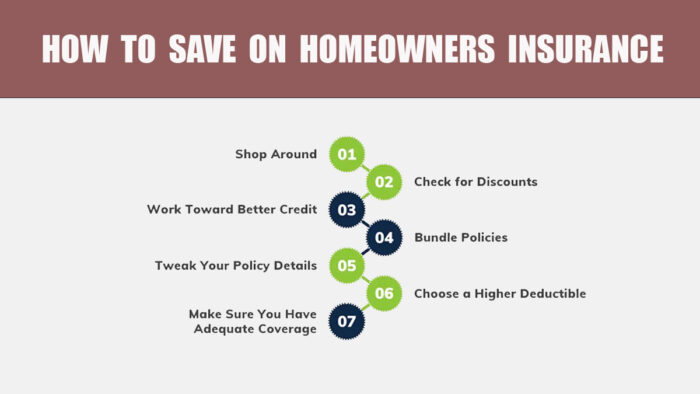If you are considering how to save on homeowners insurance, it is rarely overlooked, though it might make you spend more funds than necessary. However, the rate of homeowner insurance differs.

Many homeowners use insurance as a way to save money without paying the monthly cost, especially when it’s included in their mortgage payment. Although it usually comes during the renewal period, when the actual cost becomes obvious,.
But it has a low time commitment to discover numerous discounts and methods to save expenses. Although certain factors, like your home’s size and location, may be beyond your control, there are several ways for homeowners to trim down their insurance expenses.
How to Save on Homeowners Insurance
In order to save on homeowners insurance expenses, explore various options within your budget without compromising coverage. Also consider increasing your deductible, settling your mortgage, upgrading your roof, and checking your policy every year to identify potential savings.
1. Compare Policies
When reviewing quotes, you may encounter a wide range of options and prices. Search different insurers to identify the most suitable package for your budget and ensure you don’t compromise on coverage to get a lower price. As with any significant purchase, comparing quotes from multiple companies is a prudent starting point.
2. Security System Discounts
Installing a security system is the best way to get discounts. Some providers may request professional monitoring, while others accept simple video surveillance.
If you already have an alarm system, look for a provider offering discounts. Also, consider getting one for both a rate discount and enhanced security.
3. Improve Your Credit Score
One of the ways to save money on homeowners insurance is to improve your credit score. Your credit score influences premium costs. A higher credit score often leads to better insurance quotes. If your credit score is low due to reasons like identity theft, consider working with a credit repair company. Avoid opening new credit accounts during home buying, as it may impact your score negatively.
4. Bundle Policies
Bundling policies can result in significant savings on your premiums. Additionally, it streamlines the claims process and insurance procedures.
Managing multiple insurance policies within the year can complicate budgeting and payment tracking. However, bundling is an effective way to save time and money throughout the year.
5. Safety Improvements
Implementing safety improvements, such as fire alarm systems, will demonstrate to your insurance company your commitment to prevention. Due to these preventive measures, it can have a significant effect on reducing overall damage.
Additionally, you may be eligible for discounts when making improvements such as installing storm shutters and sprinkler systems for fire suppression.
6. Explore Discounts
Home insurance insurers extend various discounts to policyholders. When evaluating insurers, make sure to consider offers such as discounts for bundling policies, installing home security, appliances, loyalty discounts, home improvements, and nonsmoking. Additionally, inquire about potential savings for military personnel or seniors.
7. Raise Deductible
Generally, the higher your deductible, the lower your premium. However, it’s not advisable to maximize your deductible, but it’s advisable to identify where you can easily cover a deductible savings on your premium.
Additionally, home insurance deductibles are applicable each time you file a property damage claim in most states. It’s worth noting that there generally isn’t a deductible for the liability portion of a policy.
8. Pay Off Mortgage
Homeowners insurance requirements often cover your mortgage loans in full. Initially, review to verify that you don’t have any outstanding debts, such as escrow fees, and eliminate your lender’s name from the policy.
Furthermore, you have the option to modify your policy for cost savings or even consider dropping coverage altogether. Although for many homeowners, their house stands as their most significant asset and investment. Additionally, maintaining homeowners’ insurance policies still holds merit for financial coverage.
9. Replace Roof
Investing in a recent, impact-resistant roof could be costly and could potentially lead to a discount on your home insurance. Before proceeding with the service, ensure you verify which roofing materials qualify for such discounts.
Moreover, if you choose to replace your roof, it could be an opportune time to explore solar options, as reported by some reviewers on our site. Frequently, the installation process for solar panels includes necessary roof updates.
10. Annual Coverage Review
As time passes, your needs may evolve, and your insurance coverage should adapt. For instance, if you previously had coverage for precious jewelry but have now obtained a safe, you might consider removing that aspect of your coverage.
Regularly reviewing your policy ensures you are only paying for the necessary level of coverage at any given time.
Similar to other insurance types, you have the right to adjust your protection and switch insurers whenever necessary. It’s important to note that canceling coverage before the designated time may incur penalties.
11. Loyalty Discounts
Some insurers offer loyalty discounts that reduce premiums over time. While it’s wise to compare premiums periodically, consider the discounts you may miss by switching providers. Loyalty discounts often apply after the third year of service.
Explore potential loyalty discounts for home warranty coverage if you have such a plan, as reported by some reviewers.
FAQs
What Factors Determine the Cost of Homeowners Insurance?
The cost of homeowners insurance is influenced by factors such as the location of your home, its age, construction materials, your credit score, and the coverage options you choose.
How Can I Lower My Homeowners Insurance Premium?
You can lower your premium by bundling insurance policies, increasing your deductible, improving your home’s security, and maintaining a good credit score. Additionally, shopping around for quotes from different insurers may help you find a more competitive rate.
Is Bundling Insurance Policies a Good Way to Save Money?
Yes, bundling your homeowners insurance with other policies like auto insurance can often result in a discount from the insurance provider.
What is the Role of My Home’s Location in Determining Insurance Costs?
The location of your home affects insurance costs due to factors such as the risk of natural disasters, crime rates, and proximity to emergency services. Homes in high-risk areas may have higher premiums.
Does My Credit Score Impact My Homeowners Insurance Premium?
Yes, many insurers consider your credit score when determining your premium. Maintaining a good credit score can help you qualify for lower rates.



